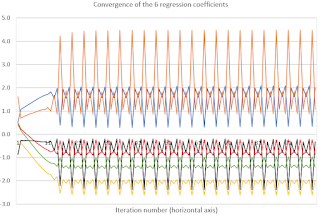A different way to do regression with prediction intervals. In Python and without math. No calculus, no matrix algebra, no statistical engineering, no regression coefficients, no bootstrap. Multivariate and highly non-linear. Interpretable and illustrated on synthetic data. Read more here.
For years, I have developed machine learning techniques that barely use any mathematics. I view it as a sport. Not that I don’t know anything about mathematics, quite the contrary. I believe you must be very math-savvy to achieve such accomplishments. This article epitomizes math-free machine learning. It is the result of years of research. The highly non-linear methodology described here may not be easier to grasp than math-heavy techniques. It has its own tricks. Yet, you could, in principle, teach it to middle school students.
Fuzzy regression with prediction intervals, original version, 1D
I did not in any way compromise on the quality and efficiency of the technique, for the sake of gaining the “math-free” label. What I describe here is a high performing technique in its own right. You can use it to solve various problems: multivariate regression, interpolation, data compression, prediction, or spatial modeling (well, without “model”). It comes with prediction intervals. Yet there is no statistical or probability model behind it, no calculus, no matrix algebra, no regression coefficients, no bootstrapping, no resampling, not even square roots.
Read the full article, and access the full technical report, Python code and data sets (all, free, no sign-up required), from here.





